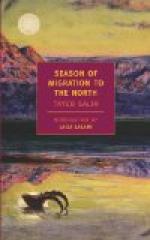Another starvation story related by the good Father is not quite so ghastly. He tells us of one “M. Finlaison of burlesque memory,” who, when all provisions were out, took his fiddle and, calling the men of his fort before the door of his empty larder, played to them a Scottish reel. That was their dinner for the day,—instead of meat they had sound. The narrator adds, “In America they would have lynched the too-jovial Scotchman. In the Northwest the good half-breeds laughed and applauded the master.”
The winter of 1844 also was a season of distress. Referring to this year, a beautiful young Indian woman said to the sympathetic priest, “I did not wish to eat the arm of my father. I was then a small child of eight, and I had not been able to see my old father eaten without crying out with loud screams. But my mother called to me in rage, ’If you do not eat of it, it is that you condemn us and hate us, then you will surely go the same way.’ And I ate the flesh of my father, hiding my sobs and devouring my tears, for fear of being killed like him; so much was I afraid of the eyes of my mother.”
Another Indian woman confesses, “I left my husband, a hunter at the fort, and took with me by the hand my only child, a boy of six, and directed my steps towards Ka-cho-Gottine. It was indeed far. I only knew the way by hearsay. Once I myself have eaten of my father, but now I am a Christian and that horrible time is far from me. I have a qualm in thinking that my stomach has partaken of the author of my days. Meanwhile his flesh has become mine, and what will happen to us both on the final resurrection day?” Here Father Petitot interpolates, “Ah! if she had only read Dante!” “I did not intend to keep my boy with me, he was too young and too weak. I did not wish to devour him. I had no heart for that. I decided to abandon him. At the first camp I left him, and knew they would eat him there. I wept on thinking of the horrible death that awaited my only child. But what could I do?” This story has a more comfortable ending than the previous one. We breathe relief in learning from the priest that the following night the little boy overtook his mother. He had walked all day and all night, following her snowshoe tracks. They went on together, the third day they snared some hares, and their troubles were over.
Father Petitot tells of a Rabbit-skin Indian who found a mummified body in the forks of a tree near the Ramparts of the Mackenzie and who came running into the Mission, his hair on end with fright, asking excitedly, “Did God make that man or was he made by the men of the Hudson’s Bay?”
Another tale of his is of an Indian, Le Petit Cochon, who had a tape-worm and thought it was a whale. “Unfortunate!” exclaims the Father, “possessed of a whale! That’s the difference between Le Petit Cochon and Jonah.” Sucking Pig said he would join the Church if the priest would rid him of the tape-worm. But we must use the words of Petitot himself, for they are too delicious to lose. “Christmas night, 1865, after midnight mass, Le Petit Cochon, carefully purged, both as to body and soul, by an emetic, two purgatives, and a good confession, content as a King, received holy baptism. I gave him the name of Noel.”




